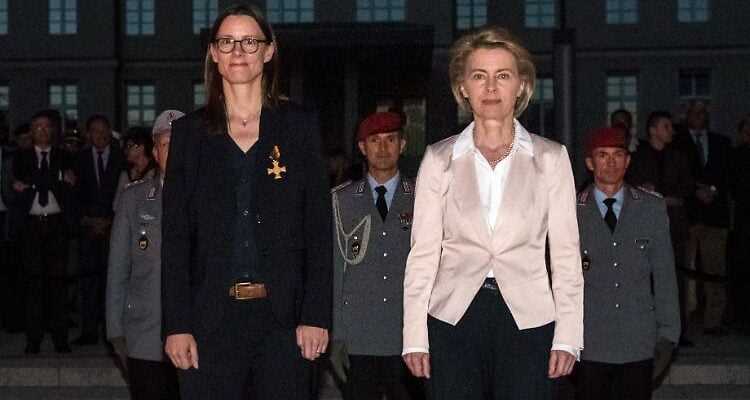Geopolitical risk for companies
“Technology has become an instrument of power”
01/28/2022, 5:48 p.m
More and more political crises challenge companies, their business becomes more vulnerable. Geopolitics should therefore be at the top of every managing director’s agenda, say two well-known consultants. Otherwise, in the event of a crisis, the business model could be shut down overnight.
There is not only the restless great power Russia and the crisis in Ukraine. Or the stress around supply chains, climate change and the lack of chips. Or the system rivalry between the USA and China. It is a bundling of risks that companies today repeatedly subject to stress tests. This fragmentation and dissolution of the old world order requires a new form of strategic planning for companies.
Katrin Suder is seen off by Ursula von der Leyen in the Federal Ministry of Defense on the Bendler Block with a festive serenade.
(Photo: picture alliance / Bernd von Jutrczenka / dpa)
“Companies need to build political muscle,” says Katrin Suder, a strategy consultant and previously State Secretary in the Defense Ministry in the podcast “Zero Hour”. “I have to deal with it more on the board.” Every company must be clear: Depending on which critical industry you play in, someone in China or the USA could “switch off the business model” overnight in extreme cases – or at least make it more difficult.
Suder has published a book with Jan Kallmorgen, the founder of the consultancy Berlin Global Advisors: “The Geopolitical Risk”. Core thesis: Geopolitics should be at the top of every board’s agenda because the risks are increasing. The crisis in Ukraine is just one example of many. “The most important lesson is: Be prepared,” says Suder. Where are employees based in Russia or Ukraine? Do I produce there, what about my supply chains? What if the SWIFT payment system is used against Russia?
“Companies have to think and plan more in scenarios and observe and understand the political maps,” says Kallmorgen in the podcast. This also includes the question: How is it that Russia is actually questioning the European order? “Vladimir Putin senses that the opportunity is good,” said the strategy consultant, who advises companies at the interface between geopolitics and business.
The two authors want to expand the concept of geopolitics – with central topics such as ESG, technology and the conflict between the USA and China. “Technology has long been an expense,” explains Suder, who was at McKinsey before her time at the Department of Defense. “Then it was an innovation driver. Now it has become an instrument of political power.” This runs through questions from the chip supply chains to data regulation.
According to Suder, the way forward is: “Technology policy is industrial policy, innovation policy, geopolitics, security policy. This requires new strategic thinking that we haven’t had to practice in Europe for a long time.” In the book, the two experts provide concrete instructions for companies on how to include these risks in their scenario planning beyond lobbying.
The Geopolitical Risk: Business in the New World Order, Campus, 232 pp. Further Information about the book can be found here.
Listen to the new episode of “The Zero Hour”:
- What happens when an athlete in China shouts “freedom for the Uyghurs”.
- Whether Germany as an export nation is in danger of being crushed between the USA and China
- How an Atlantic Bridge meeting laid the roots for the book
All episodes can be found directly at AudioNow, Apple or Spotify or via Google.
